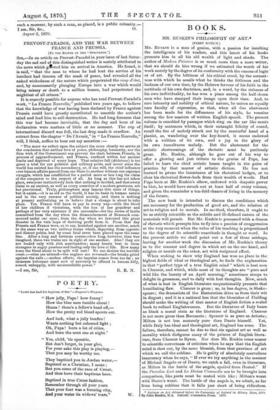PREVOST-PARADOL AND THE WAR BETWEEN FRANCE AND PRUSSIA.
[TO THE EDITOR OF THE "SPECTATOR.']
SIR,—In an article on Prevost-Paradol in your issue of last Satur- day the sad end of this distinguished writer is mainly attributed to the news which gAleted him on arrival in America. He found, it is said, "that the man to whom he had lent the service of his intellect had thrown off the mask of peace, had revealed all the naked wickedness of the nature which perpetrated the coup d'etat, and, by unnecessarily plunging Europe into a war which would bring misery or death to a million homes, had perpetrated the mightiest of all crimes."
It is scarcely possible for anyone who has read Prevost-Paradol's work, "La France Nouvelle," published two years ago, to believe that the knowledge of war having been declared by France against Prussia could have greatly contributed to unsettle the author's mind and lead him to self-destruction. He had long foreseen that this war had become inevitable, that the day and hour of its declaration were matters of little or no moment. The cup of international discord was full, the last drop made it overflow. An extract from the chapter "Dc l'Avenir," in "La France Nouvelle," will, I think, suffice to bear out my assertion :— " The more we reflect upon the subject the more clearly we arrive at the conclusion that neither love of peace, philosophy, humanity, nor the firm wish of the Government can prevent the clash between Prussia, in process of aggrandizement, and France, confined within her ancient limits and deprived of every hope. That relative fall (dechiance) is too great a trial for our political and military pride, and never since the world has existed has the ascendancy, or, if one will, the chief influence over human affairs passed from one State to another without one supreme struggle, which has established for a period more or less long the claim of the conqueror to the respect of all. As long as this has not taken place, everyone instinctively feels that nothing is decided, and that every claim to an ancient, as well as every assertion of a modern greatness, are but provisional. Truly, philosophers may lament this atate of things, but it exists,—it is as old as the world, it has its basis in human nature and in the very essence of political society, and there is nothing at present authorizing us to believe that a change is about to take place. Yes, France will have to pay in every way—with the blood of her children if victorious, with the loss of her grandeur and perhaps of her very existence if she succumbs—for the series of faults committed from the day when the dismemberment of Denmark com- menced under our eyes ; from the day when we favoured this great disaster in the vain hope of deriving profit from it. From that day Prussia and France were, so to say, launched against one another, much in the same way as two railway trains which, departing from opposite and distant points, had by some fatal error been placed upon the same line. After a long and tortuous course—less long, however, than was imagined, these two trains are in sight of one another. Alas ! they are not loaded only with rich merchandize ; many hearts beat in them strangers to angry passions and feeling only the love of life. How many tears the blood about to be spilt will cost ! No one desires the terrible crash ;—cries are uttered—the engines are reversed—the breaks grind against the rails ;—useless efforts, the impulse comes from too far ; an immense holocaust must now of necessity be offered to human folly, armed, unhappily, with uncontrollable power."
—I am, Sir, R. R. N.






























 Previous page
Previous page